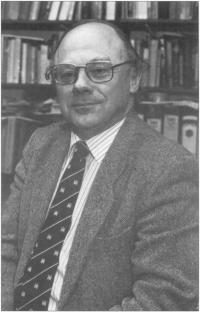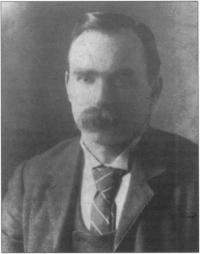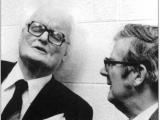Peripatetic Professor
Published in 18th–19th - Century History, 20th-century / Contemporary History, Features, Issue 2 (Summer 1995), Volume 3
Professor Joe Lee
GH: Tell us about your background.
JL: I was born in Tralee, County Kerry, in 1942. I spent my first nine years in the tranquil environment of Castlegregory, a village sixteen miles west of Tralee on the north side of the Dingle peninsula, where my father was a guard. We then moved to Ballinasloe, and four years later to Dublin.
GH: Where did your love of history come from?
JL: I don’t know. My parents encouraged me enormously in education in general—otherwise I could hardly have got to secondary school, much less to university—but they did not direct me towards history specifically. My father had vivid recollections of the early days of the state, when unarmed guards faced many difficult situations. Maybe those memories influenced me. I may have been fortunate too in going to Gormanston, not only because of the fine teachers there, but because we were lodged in the handsome castle of the Prestons, a Norman family. I don’t want to launch into a Trevelyan-type rhapsody on the power of place to inspire the historical imagination, but I do remember the sense of curiosity about the past the castle roused in a boy of twelve.
GH: When you went to university did you always intend studying history?
JL: Yes. My entrance scholarship to UCD was actually in Irish, English and Latin, but history was my first love. I was also interested in economics, but I knew nothing about it. I had a sense, however, that in order to understand history, one ought to have some grasp of economics.
GH: You were a student at University College Dublin. How did you find your time there?
JL: I was fortunate to become a student in a great history department. The two senior, if somewhat idiosyncratic personalities, Dudley Edwards and Desmond Williams, both had first class historical minds, although of very different types. The sometimes explosive, but remarkably stimulating, chemistry of their relationship has yet to be fully reconstructed. Edwards could have his erratic moments, but I always found him exceptionally supportive. Aidan Clarke’s handsome valedictory tribute to him at a memorable meeting in UCD, where the late Liam Hourican and Denis Bethell also spoke perceptively, was well deserved. Williams used generously for his students his exceptional range of international connections, and brought a cosmopolitan perspective to his teaching, at least on those occasions when his physical presence chanced to coincide with that of his class. He was such a wonderful educator that we adapted to his wayward sense of time. Some of us even stopped taking notes in his class, just to listen to him! He was a particularly acute observer of personality, and in my year his American history class sat spellbound as he probed the personalities of Jefferson, Hamilton, Jackson and Lincoln. The European perspective brought by Kevin Nowlan, a most accomplished lecturer, reflected his studies in Marburg as well as Cambridge. It was only when I joined the lecturing staff myself that I realised how essential Kevin was to the effective running of the department. Undergraduates have no idea of the amount of work involved, and given that neither Desmond nor Dudley were at their best on matters of administrative detail, the department was fortunate to find such organisational ability in Kevin, together with Paddy Ann O’Sullivan, a wonderful secretary who died tragically young. I can vouch from my own experience of twenty years in Cork the crucial role played by good secretaries. Hugh Kearney, who had just published his seminal study on Strafford, was already locating Irish history in a wider context, anticipating much of his subsequent work, as was Jack Watt, who enthralled large classes in medieval history. John Morrall, my first Tutor, had a rare gift for elucidating complex concepts in ancient and medieval political thought, and even raw undergraduates could appreciate something of F.X. Martin’s remarkable range over medieval and modern. Maureen Wall, who also died tragically young, was an incisive lecturer with a very sharp historical mind indeed, revisionist in a genuinely historical rather than political propagandist way. I was also fortunate that some senior people in Economics, James Meenan, Paddy Lynch and Alexis Fitzgerald, brought a highly developed historical sense to their teaching. Whatever criticisms may be made of that generation of Irish scholars, we should not underrate the quality of their teaching, which was at least as good as any I have met anywhere since. I hope, and believe, that good teaching remains one of the great, if under-recognised, strengths of historical studies in Ireland.

James Connolly
GH: Are there any periods or issues in Irish history of particular interest to you?
JL: I am fascinated by every period or issue I have had time to think about. The main challenge is to acquire historical perspective by grasping the linkages between as many periods and issues as possible, so that we are constantly alert to the danger of thinking that whatever period we ourselves are most familiar with must be the most important. The moment you find anybody assuming that their period is the more important, you know that, however competent they may be at monographic level, they lack historical perspective.
GH: But you prefer modern history?
JL: No. I am attracted by all periods and I have taught every century since the twelfth. But you can’t do everything yourself. I am hoping to find more time to read, or re-read, the classics of ancient and medieval history. It is unfortunate that we teach such little ancient history in history departments. I remember beautiful lectures on Roman and Byzantine history by John O’Meara and Donald Nicol in my Latin course.
GH: Why did you opt for modern history?
JL: It was almost accidental. I was looking for a good MA topic, when Kevin Nowlan, knowing I had graduated in history and economics, suggested that I work on the early history of Irish railways. The next big jump for me was geographical. Desmond Williams nominated me for a place at the Institute of European History in Mainz. It was daunting enough to change country and language without changing period as well, and I decided to work on the history of German urbanisation, particularly on the building industry. That involved concentration on the period from 1860 to 1914. In my subsequent research on labour in German industrialisation, for the Cambridge Economic History of Europe, I did a good deal of work on the eighteenth century also, increasingly convinced as I became of the continuities between pre-industrial and industrial history, despite the apparent rupture brought by industrialisation. Anyone, like myself, who has an abiding interest in rural history in general, and the history of the peasantry in particular, will find their reading taking them across centuries and cultures in the search for understanding.
GH: How did you find your time at the Institute?
JL: The Institute had an enormous influence on my development as a historian. Under the benign direction of Martin Gohring, it brought together graduates and established scholars from nearly every European country, including several Eastern European ones. There was no formal teaching, but the daily coffee round after lunch created an exhilarating atmosphere of scholarly exchange. The experience introduced me to the diversity of European historiographical traditions. When I went from there to Cambridge I found myself withdrawing into a highly Anglocentric world. Cambridge had Commonwealth and American students, but very few continental Europeans. I enjoyed Cambridge enormously, but I missed the intellectual diversity of Mainz. However, I was fortunate in that the four senior historians in my college, Peterhouse—Butterfield, Postan, Knowles and Brogan—did have a familiarity with European scholarship. It was my great good fortune that Peterhouse also had such a galaxy of younger historical talent at the time. There was a fine, if occasionally caustic, camaraderie there at that time, a true collegiality. Collegiality is the most difficult ethos of all to foster in a college, but the Masters in my time, Butterfield, the mathematician Charles Burkill, and the archaeologist, Grahame Clark, were devoted to sustaining it.
GH: Do you have a favourite historian?
JL: No, but I have learned from many. Any shortlist of my favourites would include Burckhardt, Nipperdey and Vann Woodward.
GH: Your own book, Ireland 1912-1985: Politics and Society (1989), was criticised for its lack of socio-economic material.
JL: There was as much socio-economic material as I deemed necessary to understand the quality of national performance. My main object in that book was to assess the performance of an independent state in Irish circumstances, particularly as influenced by public policy. Most histories of public life down to 1921 revolved around Anglo-Irish relations. That could no longer be the organising principle of the history of an independent state, important though the Anglo-Irish dimension remained. It is not for me to judge how far I succeeded. There are many different ways of approaching this type of subject. I have actually heard the book criticised for containing too much socio-economic material. You can’t please everybody, and you shouldn’t try, because you will simply finish up in a morass of mediocrity. There is always a danger as well of chasing the latest ‘politically correct’ fashion, which would be to prostitute history to propaganda. I don’t set out to be unfashionable, but I would have to examine my conscience if I found that everything I said was fashionable. But there is not much danger of that! Within the limits I set myself, I haven’t seen any criticisms yet that would convince me of the need to change the balance of the contents.

Robin Dudley Edwards and T. Desmond Williams
GH: So it was the public sphere that you were writing about?
JL: Yes, of course, as my preface said. Most of the criticisms I have seen were of the book the critics felt I ought to have written. I will naturally try to take cognisance of intelligent criticisms in any further writing I may do on the topic.
GH: And the lack of women?
JL: There was a lack of women in public policy-making. The history of public policy is essentially the history of political power, however much that may be embedded in social structures and social values. It was overwhelmingly men who exercised that power at that time, at least men from the lower middle class upwards. Working class men feature little. I am a fervent believer in equality of opportunity at all levels—it would be surprising if I weren’t, given my own experience of the obstacles posed by inequalities of income and place—but I try to write history as it was, as best I can, not as I would wish it to have been. Of course I may get it wrong. One of my current enterprises is a general social history of Ireland, which devotes at least as much attention to women as to men. But that involves no change of perspective on my part. It picks up on topics, including the history of women, and labour history, on which I have written or lectured, sometimes many years ago, but in which I have always retained an interest. As far as I am concerned, this type of history is neither better nor worse than other types, simply different, based essentially on different types of sources from my last book.
GH: How do you manage to combine your academic career with your position in the Senate?
JL: I have an intense interest in policy-making processes, on which I lecture in UCC anyway. In the Senate I speak on issues that I find of intrinsic interest, and on which I would be striving to keep myself informed in any case. There is a fair amount of physical wear and tear, and of sheer waste of time, in travelling regularly between Cork and Dublin. But that is nothing new for most historians living outside the capital. I had to make more than three hundred trips to Dublin archives and libraries when writing my last book, or roughly 2,400 hours spent in travel alone. The bulk of our source material on Irish history is in Dublin. If you are located in any centre lacking extensive primary sources, or even adequate secondary ones, you have to resign yourself to the hacking of regular travel unless you propose taking early retirement from research. And premature retirement from research is not part of the present ethos of Cork history, or indeed of Galway history, even though it has been suggested to me that our teaching loads tend to be relatively heavy. Whatever about that, to be productive, we must be peripatetic. What is really soul destroying for a head of department is departmental administration, and the associated college activities. Several Irish historians would probably have published more but for these calls on their time. This is not, however, necessarily all loss for the historian. One learns a great deal about human nature, and the relationship between individuals and institutions. Having said that, I am tempted to feel that I may have enjoyed an embarrassment of educational riches in both these matters by this stage!
GH: Do you think that historians have a role in political life?
JL: Not particularly. An informed historical perspective should obviously deepen one’s understanding of public affairs, but no historical education in itself can compensate for inherent limitations of temperament or judgement. There is sadly little evidence that the personality types attracted to history are exceptionally equipped for political life.
GH: Both revisionists and anti-revisionist historians have claimed you as their own.
JL: So I have noticed.
GH: Does this mean you have hit the ideal middle ground?
JL: I fear not. Obviously some views of mine must happen to coincide with some held by revisionists, and others held by anti-revisionists. But I do not think much in terms of revisionist and anti-revisionist. The sad thing is that there is so little middle ground between the protagonists, largely because of the unusual direction revisionism has taken in Ireland. In the nature of the subject, much historical writing is likely to contain an element of revisionism. One would have expected some revisionist turn to have come in the 1970s, when the great founder generation of Irish Historical Studies was reaching its natural span. Unfortunately, the outbreak of the Northern conflict helped promote a revisionism that, for the most part, and despite some impressive individual contributions, proved to be simply the opposite side of the same coin, when the more constructive revisionism that might normally have emerged would have required the minting of a new coinage. However, if the peace process can continue, maybe some of the self-delusion can be overcome and a more mature attitude emerge. In any case, authentic scholarly revisionism, as distinct from propagandistic revisionism, still lies, for the most part, in the future.
GH: You have always regarded James Connolly as important. Why?
JL: I admire Connolly because nobody has overcome so many material obstacles to write so illuminatingly about Irish history. The quality of his insights obliges one to continue to wrestle with him, however much one may dis-
agree with his interpretation. He asked big questions, which remain of enduring relevance.
GH: Recently you have been giving a series of lectures on F.S.L. Lyons and some other prominent historians. Are you going to publish these?
JL: I hope so, once I’m satisfied that they have a contribution to make to our self-understanding. The use of evidence is central to scholarly historical writing, and I’m trying to recreate the mindsets of some Irish historians in order to better understand the way they use evidence. I reject the view that history is simply another form of fiction. But study of the use of evidence cannot be confined to checking the accuracy of footnotes, useful though that exercise can sometimes prove to be. It is essential that we historians interrogate our own assumptions, including especially our silent assumptions. It is quite remarkable how limited has been the systematic analysis of the use of evidence from that perspective by historians of Ireland.
GH: Would your questioning of the assertion that the 1916 Rising had little popular support be an example of that?
JL: Yes, especially as there I was testing an assumption that I myself shared. It did strike me, however, in the light of the claims vigorously advanced in the propaganda campaigns inspired by the Northern conflict, that the basis of our evidence for our assumptions about public opinion in 1916 was extraordinarily fragile. My concern was not to prove any particular thesis, but to explore the use of evidence underlying our dominant assumptions. What I did was very elementary, and much more can be done. But it does suffice to show, I think, how uncritical our assumptions can be about even central issues unless we remember to keep asking the question, ‘how do we know?’, as well as ‘what do we know?’. What I am engaged in is not, incidentally, a destructive exercise. There is a distinct shortage of constructive criticism in writing on Irish history. I am confining my critique largely to writers I admire, and I hope that whatever is published may help us understand our subject, and the history of this country, a little bit better.
















